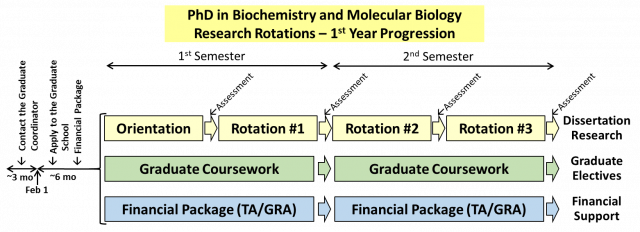Applicants for PhD degrees in BMB may be admitted by one of two options. Follow this link "How to Apply" for instructions.
1) Selection by a faculty member who agrees to act as the major professor (current/traditional approach).
2) Selection by an Entrance Committee that approves students to initiate research rotations through the laboratories of multiple faculty members.
- Applicants for PhD degrees are encouraged and are given preference for laboratory rotations. Students seeking an MS degree should follow the traditional route.
- Potential applicants should review the faculty profiles for faculty members with projects matching their interests. Contact the BMB graduate advisor (currently Brian.Ayre@unt.edu) for an up-to-date list of faculty members participating in BMB laboratory rotations.
- During the pre-application process (see "How to Apply"), applicants express interest in participating laboratories.
- Pre-applications for the research rotation option are reviewed by the BMB Entrance Committee and candidates with exceptional qualifications are encouraged to submit formal applications to the Toulouse Graduate School and the Department of Biological Sciences.
- Rotations extend through the first two long semesters, and then students continue into a laboratory for their dissertation research.
-
After being accepted:
o Students enroll in prerequisites (if necessary) and core courses as guided by the Entrance Committee.
o Students enroll in "Special Problems" for a grad school orientation and for three rotations in research laboratories, each about eight weeks in length.
o After each rotation, students present their experiences in a sharing forum with other participants.
o The students and host faculty members commit to being student and major advisor by mutual consent. - Rotating students are supported through TAs during the long semesters and through arrangements with their major advisor for the summers.
- The role of the Entrance Committee is only during the first two long semesters and responsibilities transition to the major advisor and the advisory committee as they are formed.
